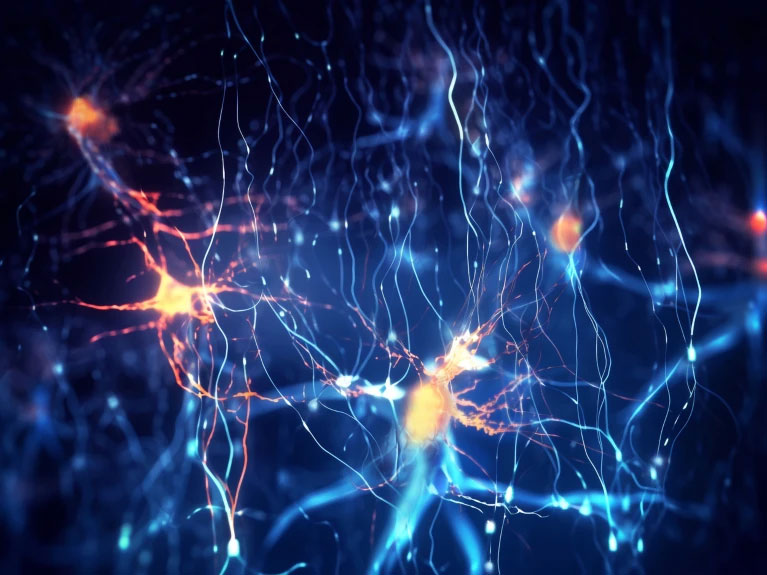Extremely detailed brain map shows the activity of neurons that encode language
The results suggest that, across individuals, the brain uses the same standard categories to classify words - helping us convert sounds into meanings.
'This study is based only on words in English. But it's a big step forward in figuring out how the brain stores words in its language library,' said neurosurgeon Ziv Williams at the Massachusetts Institute of Technology in Cambridge. 'By mapping the overlapping sets of brain cells that respond to many different words, we can try to start building a thesaurus of what words mean for the brain.'
Semantic map
There is an area of the brain called the auditory cortex that specializes in processing the sound of a word when it enters the human ear. But it is the prefrontal cortex, the area where higher-order brain activity takes place, that processes the 'semantic meaning' of a word - the essence or gist of the word.
Several previous experiments have studied this process by analyzing images of blood flow in the brain, which is a measure of brain activity. Such a method allows researchers to map the meaning of words to small regions of the brain.
However, Williams and his colleagues found a unique opportunity to look at how individual neurons encode language in real time. His team recruited ten volunteers about to undergo epilepsy surgery, each of whom had electrodes implanted in their brains to determine the source of their seizures. The electrodes allowed the research team to record the activity of about 300 neurons in each volunteer's prefrontal cortex.
As volunteers listened to short sentences containing a total of about 450 words, scientists recorded information detailing which neurons were active and when. Williams found that about two or three separate neurons light up for each word, even though the team only recorded the activity of a tiny fraction of the billions of neurons in the frontal cortex. forehead. The researchers then looked at the similarities between words that triggered the same neural activity.
A multipotent nerve cell
There are words that the same group of neurons respond to that fall into similar categories, such as actions or words related to people. The team also found that words that the brain can associate with each other, such as 'duck' and 'egg', activated some of the same neurons. Words with similar meanings, such as 'mouse' and 'rat', activate more similar patterns of neural activity than those activated by 'mouse' and 'carrot'. Other groups of neurons respond to words related to more abstract concepts, for example the words 'above' and 'behind'.

Thus, the categories that the brain assigned to words were similar across participants, suggesting that the human brain is capable of synthesizing groups of meanings in the same way. Prefrontal cortex neurons do not distinguish words by sound but only their meaning. For example, when a person hears the word 'son' in a sentence, words related to family members light up. But those neurons did not respond to the word 'Sun' in the same sentence, even though the words had almost identical pronunciations.
Read thoughts
To some extent, researchers can determine what people are hearing by watching their neurons fire. Although they cannot reproduce sentences exactly, they can, for example, know that a sentence contains an animal, an action, and a type of food, in that order. The researchers were able to identify not only the neurons corresponding to the words and their type, but also the order in which they were spoken. Language at a natural rate will be important for the development of future brain-computer interface devices that restore speech to people with disabilities.
You should read it
- This is what happens to the brain when you are hit on the head
- The human brain simulation chip consumes almost no energy when there is no input information
- 6 simple things to help your brain get better and better
- 5 ways to learn 'unusual' foreign languages on a PC or smartphone
- Good news: Learning a foreign language helps increase brain elasticity
- Encoding of Vietnamese typing methods Telex, VNI and VIQR on UniKey
 Why should all social media platforms implement Community Notes?
Why should all social media platforms implement Community Notes? Instructions for creating mouse pointer highlights on Windows
Instructions for creating mouse pointer highlights on Windows Nuclear power plant start-up process
Nuclear power plant start-up process Which type of light bulb is the most economical to use?
Which type of light bulb is the most economical to use? Google Maps tests ads that automatically pop up when users are driving
Google Maps tests ads that automatically pop up when users are driving Why is Vivaldi's anti-AI browser a great option for Internet users?
Why is Vivaldi's anti-AI browser a great option for Internet users?